Thrown, Never Asked
Posted October 2nd, 2023 at garyborjesson.substack.com
Until we make the unconscious conscious, it will direct our lives, and we will call it our fate. -Carl Jung
As many who’ve been in therapy know, it’s common to become aware of the depths of our ignorance when exploring our family. As a patient, I was alternately dismayed and relieved to discover how distorted were my stories about my family, and therefore myself. Now, as a therapist, I frequently witness patients having similar revelations.
Among the most beneficial (and unsettling) insights psychotherapy offers us learning that we’re not who we think we are. Psychotherapy becomes philosophical when it embraces the Socratic point that the first step toward self-knowledge and wisdom is becoming aware of our ignorance.
So far in these weekly reflections on How We Help I have emphasized two truths that are easy to neglect. First, that we exist through a field that dramatically affects who we become and how we experience ourselves. Second, that we’re largely unconscious of this field—especially in the west. This leads us to overemphasize the self and under-rate the role of others in who we are and why we’re suffering. So, I’ve begun these notes on the theory and practice of alliances by bringing our attention to the others, to connection, the interpersonal field, co-regulation, interdependence, and the role these play in addiction and mental health generally.
I should say why I prefer “interpersonal field” to “interpersonal biology” or “interpersonal neurobiology”. The latter invite the reductive view that our psychic experience will be understood by biology or neurobiology alone. The notion of field gives us more space for understanding. Borrowing from the example of physics, which recognizes that the particle and field are co-emergent phenomena, the human psyche is like a particle, neither reducible to the interpersonal field from which it emerges, nor independent of it. This way of thinking suggests an answer to the old debate whether ‘history makes the man’ or ‘the man makes history’; it’s both.
Back now to our two truths—that we’re profoundly affected by our environing conditions, and that we’re largely unconscious of them. These facts have been well known to philosophers since ancient times. Before I mention some examples, let me say why I think even the most practically minded ally should care. Philosophy offers us a larger, more integrated perspective, and insights that are less perishable than our usual fare. Just as it’s easier to see the particle than the field, and easier to diagnose the individual pathology than to see the interpersonal field through which it emerges; so also it’s easier to let current theories and novel practices distract us from the larger principles and processes that can help put what we’re doing in perspective.
In addition to orienting us, the philosophical perspective promises to be inspiring, reassuring, and steadying. Or so I’ve found it! To see how the challenges we currently face have been thematized by some of humanity’s greatest thinkers reminds us we’re not alone, and that there’s help.
Plato’s Socrates goes deep into the territory, for example in the famous allegory of the cave. There’s a fascinating analogy between Socrates’ depiction of the soul’s journey of education and the journey undertaken in psychotherapy. For starters, both are concerned with the defenses and psychodrama that come up on the way to flourishing. Plato wrote dialogues, not treatises, partly to remind us that the circumstances (or field) are key to understanding how knowledge and wisdom emerge in human life—when they do. More recently, Heidegger wrote of our being thrown. By this he means that we wake up already surrounded by a world, thrown into circumstances and contexts not of our making, and into a family and culture we did not choose! I’m reminded of Laurie Anderson’s song, “Born, Never Asked”—a great reminder of our thrownness.
Circling back to where we began, it seems to me wonderfully revealing that the first step toward knowing ourselves better, and taking better care of ourselves, should be a step not inward but outward! A step toward recognizing how much others have made us who we are. Socrates often promoted this by showing his interlocutors that what they call their truthsusually turn out to be a set of unexamined beliefs and opinions unconsciously adopted from family and culture. The Buddha taught us how to recognize the emptiness of our prevailing thoughts and stories. Likewise, therapy may help us recognize how partial and distorted are the stories we’ve been telling about ourselves (and others).
Recognizing our thrownness is the first step toward becoming truly ourselves. Before we can own our lives, we need to become aware of how we’ve been owned—how deep an adjustment we made to the world before we were old enough to be conscious of doing so. While that insight has contributed to my dismay at times, it’s also a relief to learn that my problems are not entirely of my own making. And now that I know, I’m more free.
